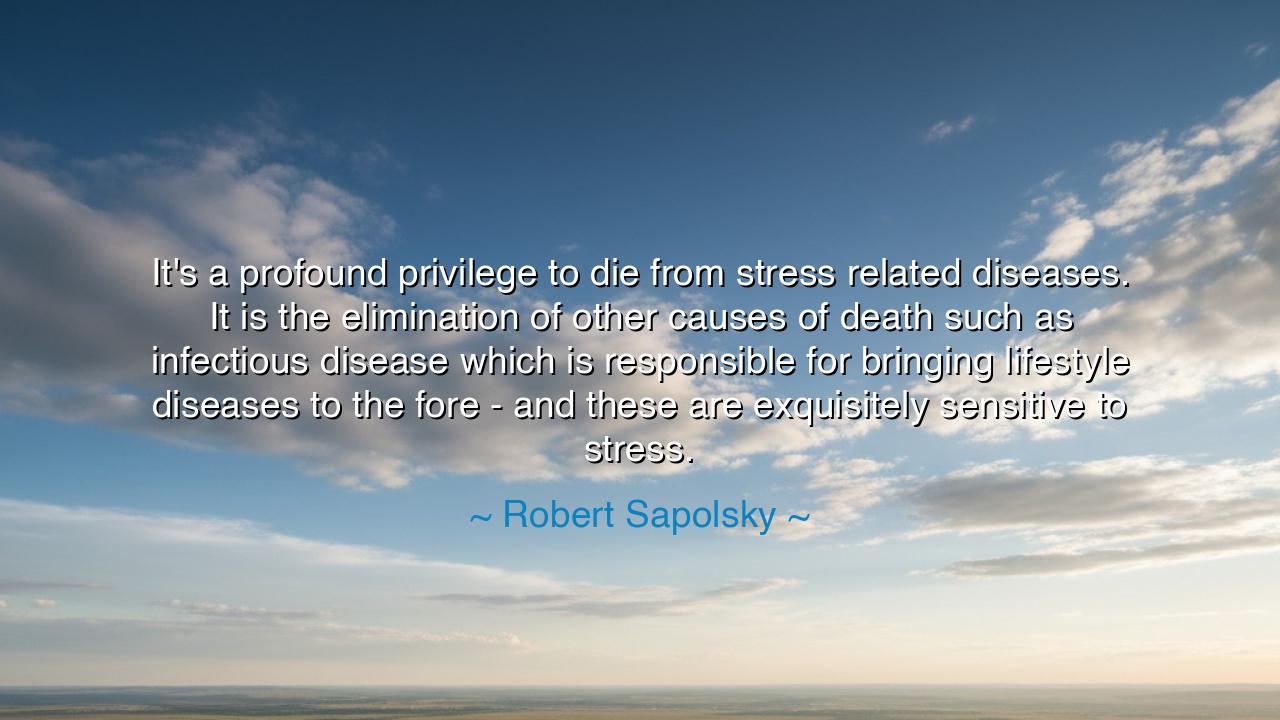
It's a profound privilege to die from stress related diseases. It
It's a profound privilege to die from stress related diseases. It is the elimination of other causes of death such as infectious disease which is responsible for bringing lifestyle diseases to the fore - and these are exquisitely sensitive to stress.






In the wise and provocative words of Robert Sapolsky, the renowned neuroendocrinologist and thinker of our age, there lies a truth that humbles the modern soul: “It’s a profound privilege to die from stress-related diseases. It is the elimination of other causes of death such as infectious disease which is responsible for bringing lifestyle diseases to the fore—and these are exquisitely sensitive to stress.” Though spoken in the language of science, these words carry the weight of philosophy. They remind us that the very burdens of modern life are, paradoxically, the gifts of progress. That to suffer from the diseases of comfort—heart disease, hypertension, anxiety, and depression—is to live in an era where famine and plague have, for many, been vanquished. What was once survival has become existence; what was once peril has become privilege.
The origin of this quote arises from Sapolsky’s lifelong study of stress and its impact on the body and mind. Through his research on both humans and animals—especially baboons in the wild—he came to understand that stress, once an ally in moments of danger, has become a constant companion in modern civilization. The zebra flees the lion, and when the chase ends, its stress subsides. But the human being, burdened by thought and memory, relives the chase endlessly in the mind. We invent new predators: deadlines, ambitions, judgments, fears. And so the machinery designed to save our lives now corrodes our health. Yet, as Sapolsky reminds us, the very ability to worry about stress is a luxury born of a world that no longer faces death by hunger or infection on a daily scale. We have conquered the ancient enemies—and now must confront ourselves.
In the ancient world, philosophers would have understood this paradox. The Stoics, like Epictetus and Seneca, taught that comfort breeds anxiety, and abundance magnifies discontent. When man’s belly is full, his mind begins to starve for meaning. Thus, Sapolsky’s insight is both biological and spiritual: the privilege of safety unveils the deeper vulnerabilities of the human heart. The diseases of the modern world—heart failure, stroke, burnout—are not punishments, but the price of prosperity. They are signs that we have risen above the primitive fight for survival, yet have not mastered the inner equilibrium required to live peacefully in our own creation.
Consider the story of John D. Rockefeller, the great industrialist of the 19th century, who built vast empires of wealth and power. By the age of fifty-three, he had more money than entire nations, yet he also suffered from crippling stress and illness. His hair fell out, his digestion failed, and he lived in fear of his own success. Doctors warned him that if he did not change his ways, he would die within a year. And so he did something extraordinary: he turned his focus outward. He began to give—to build schools, hospitals, and foundations. His body healed as his mind found purpose. In this, we see Sapolsky’s truth unfold—stress, born of abundance and ego, is cured not by retreating from life, but by reordering the heart toward meaning.
Sapolsky’s words challenge us to look upon our age with both gratitude and awareness. To say it is a “profound privilege” to die of stress is not to romanticize suffering, but to recognize that humanity’s greatest threats have shifted from external to internal. Our wars are fought not only on battlefields, but within our nervous systems—against time, pressure, comparison, and self-doubt. The diseases of the modern age are not carried by parasites, but by pace. We have outpaced our own evolution, our minds racing faster than our spirits can follow. To live well in such a time requires not the eradication of stress, but the mastery of it.
The ancients would say: Balance is the measure of life. The Buddha taught that suffering arises from attachment, and Sapolsky, in modern form, says much the same. Our chronic stress comes not from lions in the tall grass, but from the illusions we cling to—status, success, perfection. To heal, we must return to the rhythm of nature, to the simplicity that once governed our days. Breath must replace urgency; stillness must temper ambition. The heart must learn again to rest, as the zebra does, when the chase is done.
So, my child of tomorrow, take this lesson deeply into your being: gratitude without awareness becomes blindness, and progress without wisdom becomes peril. You live in an age where survival is no longer your daily struggle—so now your work is to find peace. When stress rises like a storm within you, pause, and remember: it is a mark of privilege to face such storms, and an act of greatness to calm them.
Seek balance, cultivate stillness, and live not as a creature of reaction, but of reflection. Let stress remind you of what you have gained, but never allow it to rob you of joy. For as Robert Sapolsky teaches, the modern life is both blessing and burden—and it is only through understanding, humility, and self-awareness that one may transform this privilege of stress into a life of harmony, health, and enduring grace.






AAdministratorAdministrator
Welcome, honored guests. Please leave a comment, we will respond soon